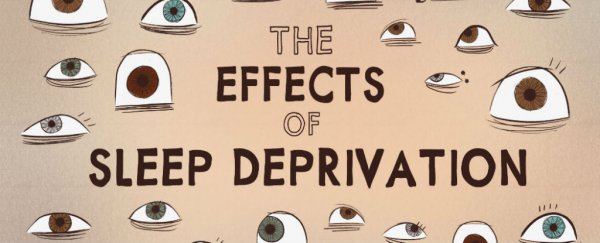Back in 1965, 16-year-old high school student Randy Gardner stayed awake for 11 days and 24 minutes - that's 264.4 hours straight. It remains one of the longest documented records for a human intentionally going without sleep using no stimulants, and on the surface Gardner appeared to get through it okay, even beating Sanford University researcher William Dement in a game of pinball on the tenth day. But all was not well with Gardner, as physiological and cognitive tests began to reveal.
As the TED-Ed video reports, after just two days of zero sleep, Gardner's eyes struggled to remain focussed, he showed some signs of ataxia - an inability to repeat simple tongue twisters - and he found it difficult to identify objects based purely on touch. According to researcher John J. Ross of the US Navy Medical Neuropsychiatric Research Unit, who was responsible for monitoring the effects of Gardner's experiment, by day three, he became moody and uncoordinated, and by day five he started hallucinating.
From there he experienced trouble concentrating, forming short-term memories, and became paranoid, and irritable. Stanley Coren from the Psychiatric Times details Ross's findings by day 11:
"Expressionless appearance, speech slurred and without intonation; had to be encouraged to talk to get him to respond at all. His attention span was very short and his mental abilities were diminished.
In a serial sevens test, where the respondent starts with the number 100 and proceeds downward by subtracting seven each time, Gardner got back to 65 (only five subtractions) and then stopped. When asked why he had stopped he claimed that he couldn't remember what he was supposed to be doing."
In fact, the effects on Gardner were so dire, the Guinness Book of Records has stopped listing records for voluntary sleep deprivation so as not to encourage further attempts. This might explain why Gardner has managed to retain the title of 'record holder' in the face of several other claims, including that of another student, Jim Thomas of California State University Fresno, who reportedly stayed awake for 266.5 hours just two weeks after Gardner set the record, and Maureen Weston from Cambridgeshire in the UK, who was listed as in previous Guinness World Records editions as having stayed awake for a whopping 449 hours in 1977 during a rocking-chair marathon.
While Gardner ended up recovering from the experiment with no discernible long-term physical and mental defects, the rest of us might not be so lucky. We might not be attempting to cut out shut-eye altogether like Gardner did, but a lot of us are trying to sustain ourselves on less sleep than our bodies need, and over several years, the health effects can be very serious.
From weight gain, high blood pressure and hormone changes to illness and an increased risk of premature death, we know that the effects of consistently getting less than the recommended 7 hours sleep a night for adults and 10 hours sleep for adolescents aren't great, and as the TED-Ed video reports, in the US, 30 percent of adults, and 66 percent of teenagers are regularly sleep-deprived.
So why exactly do we need sleep, and what's happening in our bodies that causes a lack of sleep to give some people a 4.5 times higher risk of stroke? Watch the video above to find out, and see if you can fit a sneaky 20-minute nap in at work today. Your body will thank you for it.
